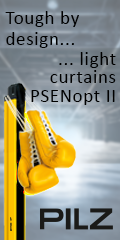
Posted to News on 8th Nov 2024, 13:30
Supply and control devices for industrial printers
Troy Stehr, Industry Account Manager at Burkert, looks at the challenges facing the printing industry and how new developments can be managed successfully.

In the world of industrial and commercial printing, the efficiency and precision of ink supply and control systems are crucial to ensuring high-quality output and minimising operational downtime. OEMs looking to create new models or update existing equipment should pay particular attention to the ink delivery system, which is so integral to the quality of their customers products.
Working with an established supplier to the industry, with the technical expertise and facilities to deliver bespoke fluidic control systems solutions, will ensure optimal performance.
As printing technology advances, so too does the need for sophisticated equipment that can handle various types of inks while delivering reliability and performance. Modular valve blocks are integral to modern ink supply and control systems. In gravity-fed systems, these components are designed to regulate the flow of ink from the reservoir to the print heads with high precision.
As print heads evolve for higher resolution and accuracy, the demands on ink supply systems increase. Circulating print heads offer the best opportunity to optimise ink for these needs. Beyond supplying ink, the system must precisely regulate pressure, vacuum, and maintain optimal ink temperature
Maintaining consistency
The precision offered by ink supply systems ensures consistent delivery, which is crucial for maintaining print quality. Variations in ink flow can lead to issues such as colour inconsistency, streaking, or incomplete prints, all of which can negatively impact the final product. By using high-quality modular valve blocks, printers can achieve more uniform results, leading to greater customer satisfaction and reduced waste.
In many industrial printing applications, inks can be highly aggressive or corrosive, especially those containing solvents or other volatile compounds. Therefore, sealing materials within ink supply and control systems are important, as they ensure the integrity of the ink flow and prevent leaks or contamination.
Seals must be made from materials that can withstand these harsh conditions without degrading over time. Common sealing materials include elastomers such as FKM, EPDM, and PTFE. FKM offers excellent chemical resistance and is often used in systems that handle solvent-based inks. EPDM, especially peroxide crosslinked EPDM, is suitable for water-based inks due to its resistance to swelling in aqueous environments, while PTFE is preferred in high-temperature applications or where low friction is necessary.
Ink selections
The type of ink used in industrial and commercial printers has a significant impact on the choice of equipment and materials. Different inks - such as solvent-based, water-based, UV-curable, and dye-sublimation inks - each have unique properties that require specific handling. Solvent-based inks are commonly used in applications that demand high durability and water resistance, such as outdoor signage. These inks are chemically aggressive, necessitating robust valve blocks and chemically resistant seals.
Water-based inks are more environmentally friendly and are used in applications like textile printing and packaging. However, they require seals that resist swelling and equipment designed to handle their lower viscosity.
UV-curable inks offer fast drying times and excellent adhesion to a wide range of substrates, making them ideal for high-speed printing on diverse materials. The equipment used must be able to handle the viscosity and curing requirements of these inks. Finally, dye-sublimation inks are used for printing on textiles and other polyester-coated materials, requiring precise temperature control in addition to robust flow management.
Transferring to new technologies
The choice between water-based and UV-based ink largely depends on the material being printed and the printing application. Each type of ink has specific characteristics: UV ink dries faster, requires less space for the drying process, and reduces costs since no heating devices are needed. However, UV inks are not permitted in certain industries due to the potential radical reaction mechanism, leaving water-based inks as the only alternative.
The choice of ink also affects the design of ink supply systems, particularly the selection of seals. Changing the ink type in an existing system presents several challenges, including how to minimise downtime during the transition.
Printer OEMs need to be able to deliver class-leading customer support and this is dependent on the support they receive from their suppliers. By working with an experienced partner that has the knowledge and facilities to develop not only the prototype, but also production quantities, end users can be assured of the best service levels.
Bespoke solutions
Burkert has an international engineering network of design and manufacturing facilities that encompass all the skills and knowledge required to develop and deliver bespoke fluid flow solutions. The whole process is managed in-house, from initial designs to prototyping, testing and production.
Central to the company's solutions for the printing industry are the injection moulding facilities which are used to create the custom valve and control modules that are key to delivering a 'drop-in' solution. Coupled with the extensive product ranges for valves, pumps and actuators, each solution can be delivered by a single source.
When it comes to delivery of production quantities, it is best if this is done by the same facility, rather than transferring the large-scale manufacturing to another source where quality control may be less effective. By retaining the entire process within the Systemhaus, Burkert guarantees the highest quality of every unit delivered.
Keeping pace with the industry
However, this is just part of the story, new printers will often need updates and further design support to meet specific customer needs. Suppliers that retain in-house design and manufacturing facilities under the same roof can deliver this more quickly and cost-effectively.
Supplying all of the components within the ink control module also ensures continued support with individual parts during the service life of the printer. Any supersession can be handled properly to ensure backward compatibility so that existing operators retain spare parts availability and their equipment continues to deliver productivity and reliability.
By working closely with trusted suppliers such as Burkert, printing OEMs and their customers can keep pace with the evolving landscape, implementing modifications and improvements quickly and effectively. Together, they can continue to develop new solutions and meet the demands of modern printing applications as they emerge.
Want the latest machine building news straight to your inbox? Become a MachineBuilding member for free today >>
Fluid Control Centre
1 Bridge End
GL7 1QY
UNITED KINGDOM
+44 (0)1285 648720















